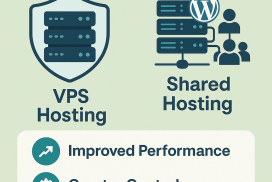What Makes a Good Hosting Provider? Here’s What to Look For
Selecting the right web hosting provider is crucial for your website’s performance, security, and long-term success. Your choice affects everything from user experience to search engine visibility, so it’s important to make an informed decision. With so many hosting companies available, how do you know which one is the best for your needs?
This guide highlights the critical factors that define a good hosting provider, offering insights into what you should look for before making your decision.
1. Customisation and Control
A good hosting provider should offer a high level of control over your hosting environment. This includes the ability to configure your server settings, install custom software, and manage various aspects of your website’s backend.
Look for hosting providers that offer root access or SSH access for more technical users. If you’re not particularly tech-savvy, choose a host that provides an easy-to-use customisable dashboard that allows you to manage essential elements of your website with minimal hassle. When looking for a hosting provider that offers reliable performance and customer support, consider Krystal hosting, which is known for its high uptime and excellent services.
2. Support for Multiple Platforms and Technologies
Every website is unique, and so are the technologies it requires to function optimally. A hosting provider should support various platforms and technologies like PHP, Node.js, and Ruby on Rails, as well as popular content management systems (CMS) such as WordPress, Joomla, or Drupal. This gives you the flexibility to run different types of websites with ease.
Make sure that the hosting provider is capable of integrating with the tools and frameworks you plan to use. Whether you need a basic setup or something more advanced, it’s important to have the right environment to support your goals.
3. Data Centre Location
The physical location of a hosting provider’s data centres plays a role in your website’s speed and accessibility. If your audience is predominantly based in a certain region, choosing a provider with data centres close to that region can enhance website speed and lower latency.
For global reach, look for a host that has multiple data centres around the world or integrates with a content delivery network (CDN). This ensures that your site loads quickly for users, regardless of their location, providing a more seamless experience for your visitors.
4. Energy Efficiency and Eco-Conscious Hosting
In an age where sustainability is increasingly important, you might want to opt for a hosting provider that practices energy-efficient hosting. A good hosting provider should invest in energy-efficient servers and cooling technologies, which not only reduces costs but also minimises their environmental impact.
Some hosting providers go a step further by using renewable energy sources or engaging in carbon offset programmes. If environmental sustainability is a priority for you or your business, consider choosing a hosting company that aligns with your values by adopting greener practices.
5. Hosting Reputation and Longevity
The reputation of a hosting provider is a reflection of its long-term reliability and service quality. Established providers often have a track record of stability, customer satisfaction, and consistent service over the years.
Look for hosting companies that have been around for a while and have garnered positive reviews from reputable sources. Newer hosts can also be reliable, but established providers offer peace of mind, knowing they’ve been tested over time in different scenarios.
6. Advanced Features for Developers
If you’re a developer, you may need advanced hosting features that support more customisations and integrations. These might include:
- API access
- Version control support (e.g., Git integration)
- Webhooks
- Staging environments for testing
- Containerisation (e.g., Docker support)
Look for a hosting provider that gives you the tools necessary to build, test, and deploy your site or application with ease. This is especially important if you’re building complex or custom applications that require a unique set of features.
7. Flexible Billing and Payment Options
Different businesses and individuals have different billing preferences. Some may prefer to pay annually, while others may opt for monthly payments. A good hosting provider should offer flexible billing options that cater to your needs.
Additionally, the ability to easily upgrade or downgrade plans without penalty is important. Some providers charge hidden fees for changes, so be sure to check their payment terms and flexibility before making a decision.
8. Support for E-commerce Features
If you’re running an e-commerce store, you’ll need hosting services that support e-commerce features like SSL certificates, payment gateways, and shopping cart integrations. A hosting provider that specifically offers e-commerce hosting can provide optimized resources, as well as enhanced security features.
Look for hosts that provide PCI compliance to ensure that customer payment information is securely processed. A good e-commerce host will also include tools that help you manage inventory, track sales, and integrate with various third-party applications.
9. Security Features Beyond the Basics
When it comes to website security, basic features like SSL certificates and firewalls are just the beginning. A good hosting provider goes further by offering advanced security tools such as:
- Security auditing
- Intrusion detection systems (IDS)
- Backup encryption
- Real-time monitoring of traffic patterns
Some hosts also offer security-as-a-service packages that provide additional protections, such as vulnerability scanning and proactive incident response. These services can give you peace of mind, knowing your website is protected from threats around the clock.
10. Affordable Add-ons and Services
While your initial hosting plan may cover the essentials, many hosting providers offer add-on services to enhance your hosting experience. These might include:
- Dedicated IP addresses
- SEO tools
- Advanced analytics and reporting tools
- Additional storage space
- Advanced email services
Be sure to check whether these services are available and if they’re priced reasonably. Some hosts offer these add-ons at discounted rates or bundle them with specific hosting plans, helping you save money in the long run.
11. Clear Communication and Transparency
A hosting provider’s ability to clearly communicate its policies, terms, and any potential issues is essential for establishing trust. Look for a provider that offers clear and transparent communication regarding service status, downtime, and any updates affecting your hosting environment.
Check how they communicate during service disruptions—do they notify users proactively, or do you have to discover issues yourself? Good communication builds trust and ensures that you’re never in the dark about the status of your website or hosting account.
12. Support for Email Marketing
Email marketing is a powerful tool for businesses to engage with their audience. A reliable hosting provider should offer email marketing features, such as:
- Email automation
- Personalised email templates
- Email list management
- Deliverability tracking
Many providers offer integrated email marketing services, helping you easily manage and grow your email campaigns directly from your hosting platform.
13. Disaster Recovery and Redundancy
Disasters, whether natural or digital, can strike at any moment. A good hosting provider should have disaster recovery plans in place to protect your website from data loss. This includes regular backups, failover systems, and redundancy measures to ensure business continuity.
Redundancy means that if one server fails, your website will continue running on a backup server, minimising downtime. Verify with your hosting provider about the redundancy measures they have in place to protect your website from unexpected outages.
Conclusion
A good hosting provider is much more than just a place to store your website. It’s an essential partner in ensuring the speed, reliability, security, and growth of your online presence. Whether you’re just starting out or managing a large-scale business, selecting the right hosting provider is crucial.












